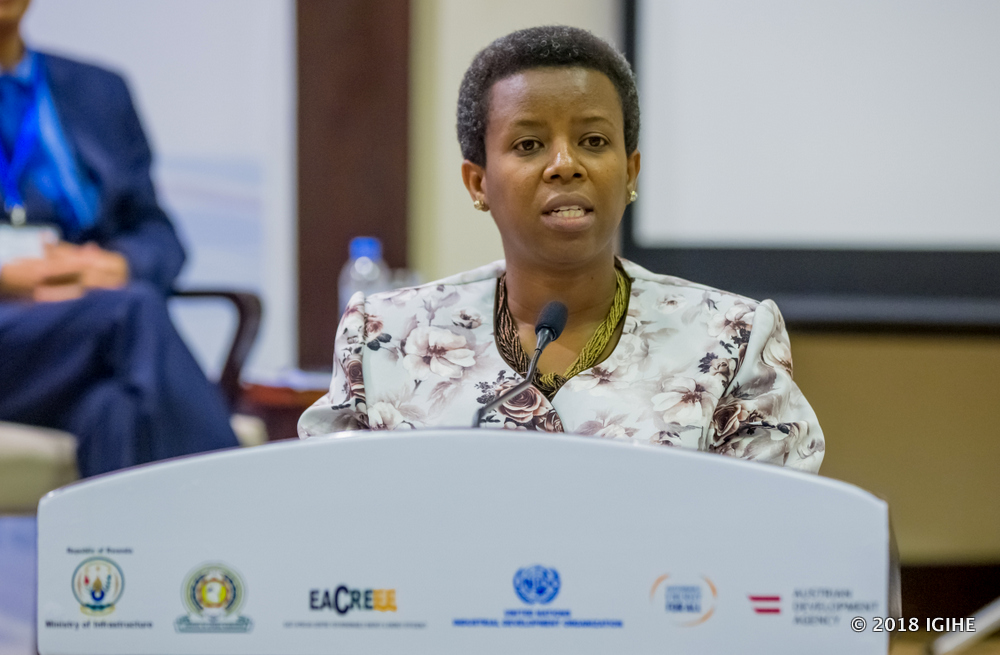Kigali, 19 March 2018: Minister of State in charge of Energy and Water, Hon. Germaine Kamayirese officiated the opening of Sustainable Energy forum for East Africa organized by the Government of Rwanda through the Ministry of Infrastructure in partnership with the East African Community (EAC) Secretariat, East African Center for Renewable Energy and Energy Efficiency (EACREEE), United Nations Industrial Development Organisation (UNIDO), Sustainable Energy for ALL (SE4ALL).
The three-day conference convened over 400 delegates from the globe and these include leaders from Governments, private sector operators, civil society, academia and international organizations to drive faster actions toward achievement of Sustainable Development Goal 7, which calls for universal access to sustainable energy by 2030.
The aim of the forum is to promote access to renewable energy sources in the East African region. Experts in the renewable energy resource development will exchange ideas and best practices on how to improve access to clean energy sources in the region.
The EAC Heads of State Summit held in February in Kampala, Uganda, underlined the need to mobilise resources required for the implementation of new and ongoing priority infrastructure projects, including energy.
Speaking at the opening of the first Sustainable Energy Forum for East Africa 2018, Minister of State in charge of Energy and Water, Hon. Germaine Kamayirese, urged participants at the forum to take advantage of the platform and forge effective partnerships for resource mobilisation to implement key infrastructure projects, including the Sustainable Development Goal7 target of ensuring access to affordable, reliable, sustainable and modern energy for all in the EAC.
“Today’s event is yet another manifestation of how much renewable energy and energy efficiency are a priority in transforming our economies and consequently our lives,” she said.
“The 2017 report by the International Renewable Energy Agency (IRENA) indicates that African countries need to meet fast-growing energy demand and extend modern energy services to more communities while also improving people’s health and ensuring long-term sustainability.
The continent could meet nearly a quarter of its energy needs through the use of indigenous, clean and renewable energy,” Kamayirese added.
The Government of Rwanda, she said, “is committed to achieving universal access to sustainable energy by 2024 with a focus on renewable energy resources. This requires doubling generation and demand capacities by working closely with development partners.”
The EAC deputy Secretary General in charge of Productive and Social Sectors Hon. Christophe Bazivamo, called for collaborations among sector players, including between governments, private sector and developing partners.
“Nearly 80 per cent of east Africans live in rural areas and their main source of energy is traditional biomass consisting of fuel wood, charcoal and agricultural waste”. He said.
According to the East African Industrialisation Strategy (2012-2032), the EAC seeks to diversify the manufacturing base and raise local value-added content of resource-based exports to at least 40 percent by 2032.
“To achieve our industrialisation targets, we need to accelerate access to sustainable energy and promote energy production for productive uses. We realise that we can not do this single-handedly. We need to revitalise our regional cooperation and partnership with development partners around the globe,” Bazivamo added.
According to him, “Energy is a key priority for the six-nation bloc to ensure availability of sufficient, reliable, cost effective and environmentally friendly energy sources in the region would facilitate achievement of broader EAC objectives, including attracting investments and promoting regional competitiveness”.
The ongoing forum in Kigali is focusing on seven thematic areas: access to energy; roadmap of a sustainable energy future for east Africa; financing sustainable energy projects in the EAC; energy and gender in the region; sustainable city development in the region and geothermal energy.

 ENGL
ENGL KINY
KINY